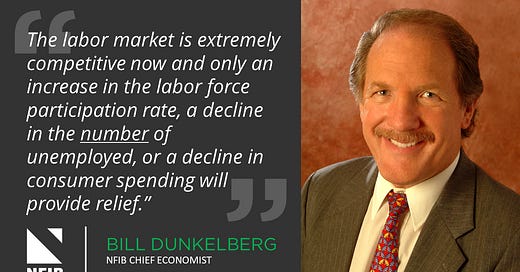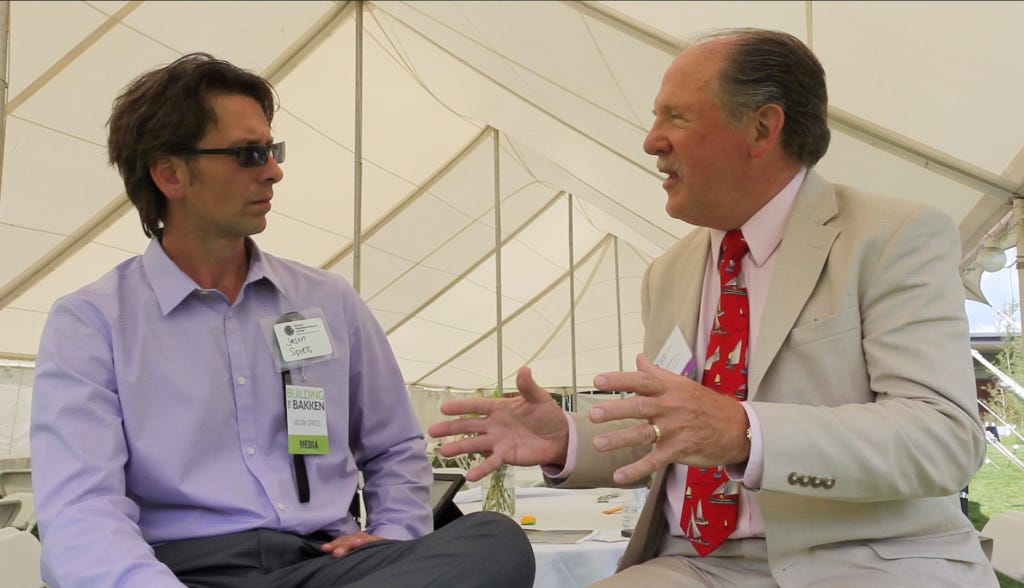Dr. Bill Dunkelberg is a Chief Economist for the National Federation of Independent Business since 1971, Dr. Dunkelberg is a nationally known authority on small business, entrepreneurship, consumer behavior and consumer credit and government policy.
He is a past president and a Fellow of the National Association of Business Economists [NABE].
Dr. Dunkelberg has served as a regional judge for the Ernst & Young Entrepreneur of the Year program for 10 years and as a member of the board of the Greater Philadelphia Chamber of Commerce.
Dunkelberg is a former Professor of Economics at Temple University, the former Dean of the Fox School of Business, and serves as Chief Economist for the National Federation of Independent Business. He has appeared on CNBC, Bloomberg, CNN, MSNBC, the ABC, CBS and NBC Evening News programs, Good Morning America, and numerous local news and business TV and radio shows.
He is frequently quoted in the Wall Street Journal, Business Week, the New York Times, U.S. News and World Report, USA Today, Time, and Newsweek. He also serves on the economic forecasting panels for USA Today, Business Week and Bloomberg and as an economic consultant to ABC News.
Dr. Dunkelberg believes that in order to reduce unemployment and increase economic growth, the small business sector needs to grow. Natural gas and energy independence could bring many new companies to the US and would create jobs and growth.
Additionally, the meeting discussed the pros and cons of having low energy prices from the perspectives of both consumers and producers.
Potential investors should invest strategically in exchange-traded funds while considering the long-term future of the energy industry.
Other interview topics:
- Increase opportunities for small businesses through support services in North Dakota.
- Encourage and invest in the building of pipelines delivery systems and technology infrastructure to ensure energy independence.
- Increase business opportunities by bringing petrochemical, natural gas, and fertilizer companies to the US.
- Encourage technology development to get oil and gas out cheaper, better, and with less damage to the environment.
- Consider both the consumer and producer perspectives when making decisions regarding energy prices.
- Analyze the potential impact of regulations on energy production and job growth.
- Strategically invest in exchange-traded funds for the energy industry for long-term growth.
Jason Spiess
Let's talk about that a little bit, explain what the National Federation for Independent Business
Dr. Bill Dunkelberg
does. Well, NFIB was founded in 1943 as a kind of counterpoint to the, yeah, whatever that is the Chamber of the Chamber of Commerce, which, you know, which was tended to be dominated by the major donors. And I kind of said, you know, here we're going to represent small business and here's the deal, I'll just make up some numbers, $50 to be a member, but the most anybody can contribute is $200. So they put a ceiling. Exactly. So, and then they're run by a big board of independent
businesses. So that way, you know, they aren't going to be dominated by big firm money, which you typically happens in the chamber. It doesn't mean that bad chambers are bad. Chambers have lots of small business members. So they were founded in 1940 for that. They currently have about 350,000 member firms across the United States. They lobby on behalf of small business in Washington DC, of course, and in every state capital in 50 states. So that's basically what does a quick
Jason Spiess
state of the union for small business, I guess. You know, we hear that it's the engine of the nation's economy. But every time I turn around I see consolidation, I see duopolies popping up left and right is small business. Ok.
Dr. Bill Dunkelberg
Well, that does happen, but it's always a dynamic. I mean, you know, the, the small business sector, first of all is the R and D for the, anybody who's got a new idea about a product or a service or how to do something better or whatever, you start it out there. And if you're right, you are rewarded with profits that funds your growth, people copy you.
So you get more firms if you're wrong. Well, you know, we fail and we have that all the time but we don't lose you, we don't lose the building you're in. So if your Chinese restaurant failed, you reopened it as a French restaurant, the same chef, you know, I get it. But you keep, you keep using the resources until you make money, which is the signal that you're using the resources.
Well, that's the strength of the US economy. That's how we allocate resources. So it's always very dynamic and we forget, of course, that all these big firms start off. Small Microsoft started off as one person Walmart started off as one store and they did things right. And so this is what we got. But the other thing we forget about is that Walmart was not the only store trying to do this. There were a lot of firms trying to do an operating system and they didn't make it.
But over years and years of all of this trying to get it done, tens of millions of people got jobs on the job training, got skills. So just the dynamic of the small business sector employs tens of millions of people. We look at it steady state wise, small businesses defined as those with 500 or fewer employees by the SBA employ over half of the private sector workforce and produce half of the private sector GDP. So small business is really big business,
Jason Spiess
small business is really big business
Dr. Bill Dunkelberg
now. It's not doing very well lately, but then most of the economy is not doing so well. We are bifurcated. The stock market is a new record high today and there are corporate profits but those big firms are selling around the world in which our small businesses can't do. So they're doing very well. Let's say they're growing at 4%. Small business sector isn't really going anywhere, especially since it dominates the service sector.
And consumer spending on services has been very, very slow. So we're not growing much at all. So let's say 00 plus four divided by 2% growth. That's what we've had since the recovery started 2% growth and until we can get the small business sector back to life, hiring people. So we can get the unemployment rate to fall. We're going to have sluggish
Jason Spiess
growth in your opinion. How important is the energy sector to small business?
Dr. Bill Dunkelberg
Well, there are, it's important to small business, but to the economy, I mean, there are two kind of bright spots in the economic outlook. Housing. Right. So we're coming from housing starts with only 500,000. After we were at 2.2 million, we fell all the way to 500,000, we're back. So maybe we'll do a million at an annual rate this year. So that would create a lot of jobs that we lost in the housing market.
The other is energy, energy is an incredible bright spot. And although a lot of it is focused out here kind of in that strip from Texas to up to the Canadian border. There are other places that have like Western Pennsylvania and so on. So California, California's got, you know, if they can just get out of their own way, you know, these resources. So it's going to be really wonderful. And so right now, lots of jobs could be created if we get the keystone approval.
Obviously, you know, moving the is really important, the raw material. So there's we can easily become energy independent in a decade or so. That doesn't mean energy is cheap. It means that we would just be buying most of what we use, oil gas, whatever coal right here in North America that, that would be really cool.
Jason Spiess
What does that mean to be energy independent in a global economy?
Dr. Bill Dunkelberg
Well, what it means is that you're buying everything here, it's independent, didn't say cheap, right? And the natural gas thing is a great example. Natural gas in the United States sells for about three bucks an MCF. But in Europe it's 13. Now look at oil, the price of oil. A barrel of oil is the same kind of everywhere. Well, the difference is everybody can export and import oil.
So all the producers can export and people can buy it. We can't do that with our natural gas. We don't have any way to export it. So you can understand that over the next 10 years, there will be a lot of money to be made and we should do this and learning and getting set up to export this natural gas to customers around the world. Their price will come down, our price will come up and natural gas in a decade say where we like oil, we come to the same price everywhere.
That's what you have in a big competitive market. And the process of doing that of course, is going to be wonderful for the US economy and particularly those states that have all of this energy to be developed.
Jason Spiess
North Dakota being one of North Dakota
Dr. Bill Dunkelberg
is wonderful. You know, I
Jason Spiess
wanted to ask you about the gas before we get into oil, natural gas. Kenin Debelo, he's CEO of Black Ridge, Black Ridge Oil and Gas. He was a former Exxon executive told me that the petrol chemical industry is putting $2030 billion into importing exporting refineries, something like that.
That's what you're talking about here. What do you make of that as far as the amount of money, the amount of investment is that going to bring natural gas to the oil? Gold, silver where it's a universal price.
Dr. Bill Dunkelberg
I think so. I think, you know, again, we just have to have a free market where it's traded right now. Lots of people would love to have our cheap natural gas, but we can't get it to them. So just internally in the economy, we have to build the delivery system, the pipelines and so on to get that done, we also have to change our technologies for cars and vehicles in the sense and then get gas stations where you can get natural gas, gas gas, right.
All of that. And of course, that's wonderful for jobs and growth and so on. In the meantime, companies that use petrochemicals want this and can't get it. So they're going to come to us. So if you look at the building that's going to go on over the next 10 years of new companies here that make stuff that uses petrochemical, natural gas, fertilizers, all these kinds of things. But that's going to bring a lot of new companies here to the us and again, that's going to contribute to job
growth and growth in our GDP. And that's really good news, um especially for North Dakota, but North Dakota is going to, you know, see some of those plants, but they're really going to get it out and then send it somewhere. And so we need a lot of work and jobs will be putting those pipelines in
Jason Spiess
the gold, gold back in. I forget that you're in South Dakota. They say the people who sold shovels made the money. You work with a lot of independent and small businesses. Historically, oil booms are going to produce shovel salesmen, whatever the shovel might be. Are there any businesses that historically stand out like the shovel business with an oil boom? Whether it be natural gas or you know what I mean to our small business, small
Dr. Bill Dunkelberg
business thrives. Well, most of it is more of the same that is if you go to North Dakota where you find they're short on housing, short on places, you know, motels and hotels, short on restaurants, short on barber shops. That's right. The sector that small businesses are really good at. I mean, we build most of the houses and we cut hair, we do. So it's really more of the same that you have to have. Now, there are some specializations like you have a tremendous, you have a large number
of guys who have made a lot of money carrying water used for fracking, you know, so there are some specialized businesses that you have a lot more water carriers in North Dakota, right? Than you would have in most States, right? But most of it is, you know, pretty much just more of the kind of fundamental support services that, that any collection of people.
Jason Spiess
So the, I see what you mean because it depends on the technology that goes
Dr. Bill Dunkelberg
up to it. Right. So,
Jason Spiess
ok, former governor Ed Schafer calls the bak in a technology boom as opposed to an oil boom, what do you make of that statement?
Dr. Bill Dunkelberg
Well, you know, it is a technology boom and first of all doing, doing all of this with the fracking and I mean, that's been a big technological development. It's been around for a while, but it's really been refined. The second thing of course is that once there's money in it, this is the way markets solve problems, technological advance moves much faster because there's a payoff to solving problems.
So markets don't solve problems until they're worth solving. And this one is those kinds of issues that are now worth solving. So finding out how to get the gas and the oil and everything out cheaper, better with less damage to the environment. Those are those all have big payoffs. And so ... it's driven by of course, the energy requirements of a growing country and a growing world. ...
Jason Spiess
So I got two more here. I'm trying to remember what this next one was going to be going ahead. Here was the one. Oh, I got it. Ok. Price of oil between your readings, your colleagues. Or if you go to a psychic reader, they say that if the price of oil reaches a certain amount, the oil activity stops one of two things that could upset the boom, the EPA and the
price of oil. Have you heard from anybody about the price of oil as far as what that sweet number might be? Or a range to where say investors should probably talk with their other
Dr. Bill Dunkelberg
investors. Yes. Well, that's of course, a hard call. It depends on your perspective. From the consumer's perspective, the lower the price, the better, the better. All right. So that's really nice because then they can use lots of oil and oil products. On the other hand, from the producer side, the lower the price, the less I can produce because there's a cost of getting a barrel out of the ground.
And I got all the Jed Clampett oil a long time ago. That was a really cheap. So now it's very expensive and I have to drill down 10 miles and bla bla, bla, bla bla. So if prices get too low, then of course, we can, we can't effectively produce it without, you have to be able to make a profit here. So that's really the balance and you really have to let markets kind of sort that out Now, if you get rules put on top of that, like it says, you know, you have to fracking water has to be returned to the
river in a pure state. And we've got some regulation by the way, where cities have to put water in back into a river cleaner than they took out the house. I mean, you can get these kinds of regulations. So those kinds of regulations raise the cost and therefore reduce the supply that slows down the process, right? That's reducing the supply job growth will be slower, etcetera. So that's the balance that we have.
And you know, in some people's view, of course, we've got a bunch of people writing these regs who have never had a job in the private sector and don't have a clue. We had 100 or so of those try to rewrite restructure 15% of GDP called the health care industry and what that's doing. And we could have the same kinds of problems in the energy side, you know, so we have to be very careful about uh about
Jason Spiess
that. I'm not sure we have enough tape for the health care, small business,
Dr. Bill Dunkelberg
we go there. It's kind of an example of, you know, the people who are writing these regulations, I'm sure they want good things to happen, but they don't have any kind of the experience that they should have an understanding of how private sector works so that the regulations, they will often be very counter productive. Very
Jason Spiess
final question advice for potential investors, whether it's a 24 year old, driving out to the Bakken oil boom to make his hut million or a 65 year old seasoned veteran. Looking at getting back in the game, any advice you might have for somebody entering an energy sector like that.
Dr. Bill Dunkelberg
Be careful.
Jason Spiess
I think that's good, by the way, just be
Dr. Bill Dunkelberg
careful. Don't light a match. It's very volatile stuff. Yeah. Well, of course, there are two ways to invest in it. One is to actually go there and become and start a water carrying business or go there and build an apartment building to rent out or go there and build a motel or a or whatever. That's one way to invest. And of course, you're taking a risk because this is a long term investment.
The building is going to be here a long time you're counting on, you have to think about how long will this last? Now, just as a simple example, there's a lot of work that goes into drilling a gas well, but once it's capped, not a whole lot there, right. So you have to think very carefully about not just this year and next year, but you know what's going on in the future in terms of being an investor, like buying stocks and shares in a company, you know, the demand for energy is just going to
go on forever. So if you want to be, if you think energy is going to be good energy in the long run, then you should think about investing in an exchange traded fund like X, which just puts lots of these companies in there for you. You don't have to worry about idiosyncratic risk, which is kind of like a Martha Stewart problem, a good company, but the stock crashes because she did something stupid and that's idiosyncratic.
You don't need that. So you want a whole bunch of them. So you, so you strategically invest in health care or in energy and use that kind of an approach to get in. But in both cases, you really have to think about longer about the future. And it's just that if you go out there and start a water transportation company, it's harder to get out of it once things change than to call up your broker and say, sell my
Jason Spiess
bill Elber. Thank you very much. My pleasure.
Please consider supporting those who are Living The Crude Life! The oil and gas worker is experiencing the same public relations issues the farmer’s faced decades ago when the grocery story replaced them. Only it’s the light switch that has replaced those Living The Crude Life.
Your company and/or personal support will allow positive, informational and educational stories, interviews and podcasts to continue. Real talk. No scripts. Just energy experts and real crude talk.
Paid Subscriptions are only $5 and keep the articles, podcasts, news, essays and insights coming.
Network online, in social media groups and in podcast land! Support the industry’s voice for only $5!
Did you know supporting The Crude Life is more sustainable for the planet than a $5 Starbucks Coffee? You have the power to make a difference! Support The Crude Life today!
For guest, band or show topic requests, email studio@thecrudelife.com
About The Crude Life
Award winning interviewer and broadcast journalist Jason Spiess and Content Correspondents engage with the industry’s best thinkers, writers, politicians, business leaders, scientists, entertainers, community leaders, cafe owners and other newsmakers in one-on-one interviews and round table discussions.
The Crude Life has been broadcasting on radio stations since 2012 and posts all updates and interviews on The Crude Life Social Media Network.
Everyday your story is being told by someone. Who is telling your story? Who are you telling your story to?
#thecrudelife promotes a culture of inclusion and respect through interviews, content creation, live events and partnerships that educate, enrich, and empower people to create a positive social environment for all, regardless of age, race, religion, sexual orientation, or physical or intellectual ability.
Spread the word. Support the industry. Share the energy.
Click on picture for BIG SAVINGS! Check out these Amazing American Environmental Entrepreneurs! Don’t forget that the promo code OTIS unlocks big big savings!
if link is broken, use promo code OTIS at www.mystore.com and www.mypillow.com



















Share this post